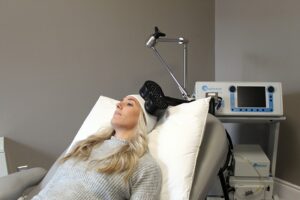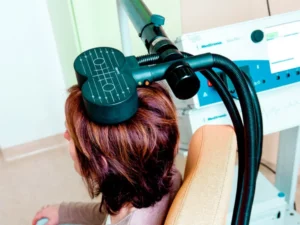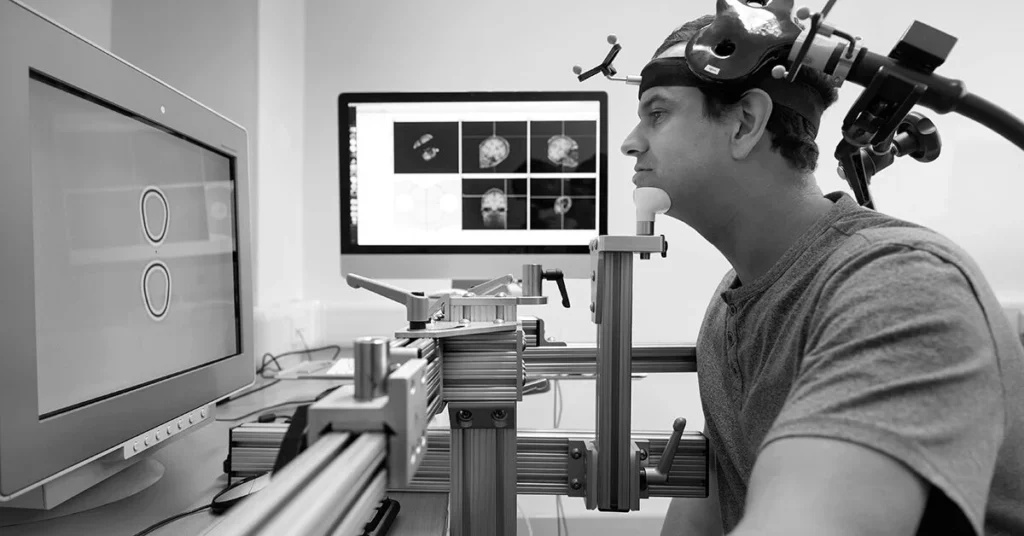There is a new treatment for OCD that is gaining popularity – rTMS. But what is it, and is it effective? In this blog post, we will answer all of your questions about rTMS and OCD. We will discuss what rTMS is, how it works, and the benefits of using rTMS for OCD. And we will also discuss the risks that you should be aware of.
Contents
What Is rTMS?
 rTMS stands for repetitive transcranial magnetic stimulation. It is a type of treatment that uses short bursts of magnetic energy to stimulate areas of the brain. This non-invasive therapy has been used to treat conditions such as depression, anxiety, and chronic pain.
rTMS stands for repetitive transcranial magnetic stimulation. It is a type of treatment that uses short bursts of magnetic energy to stimulate areas of the brain. This non-invasive therapy has been used to treat conditions such as depression, anxiety, and chronic pain.
It is actually a pretty simple procedure. A device is placed against your scalp, which generates a magnetic field that passes through the skull and into certain areas of the brain. This stimulates nerve cells in the targeted region, potentially helping to improve symptoms.
Studies have found that rTMS can be effective in reducing depressive symptoms and improving quality of life. However, the effects may not be long-lasting, and some people do not respond to the treatment at all. So, be sure to talk to your doctor about any concerns or questions you have.
Is rTMS FDA-Approved For OCD?
If you are considering rTMS as a treatment for OCD, it is important to know that it is not yet FDA-approved for this specific condition. However, the FDA has approved rTMS for treating depression, and some studies suggest that it may be effective in treating OCD as well.
It is important to discuss your options and the potential risks and benefits of rTMS with your doctor to determine if it is right for you. Additionally, there are clinical trials underway that are investigating the effectiveness of rTMS for OCD. These clinical trials may provide valuable information about its efficacy in treating this condition.
Ultimately, it is important to remember that rTMS is not a “cure” for OCD. But it may help to improve symptoms for some people. As with any treatment option, the risks and benefits need to be carefully weighed before making your decision.
How Does rTMS For OCD Work?
rTMS is a non-invasive, painless therapy that uses magnetic fields to stimulate nerve cells in the brain. During treatment, an electromagnetic coil is placed near the head and short magnetic pulses are delivered to targeted areas of the brain. This stimulates activity in those regions and helps modify abnormal activity associated with OCD symptoms.
For instance, rTMS has been used to target the orbitofrontal cortex, which is believed to play a role in compulsive behavior. During treatment, patients can expect to sit or lie down comfortably while being monitored for any unusual reactions. Each session typically lasts between 30 and 90 minutes.
Studies have found that rTMS may be effective in reducing symptoms of OCD, including intrusive thoughts and compulsive behavior. Compared to other treatments like medications or cognitive-behavioral therapy, rTMS is considered a safe and relatively low-risk option.
However, it’s important to remember that rTMS is still in the early stages of research. And there is currently no standard protocol for this type of treatment. While the treatment may not be right for everyone, there is hope that it can offer much-needed relief for some people living with OCD.
What Are The Pros And Cons?
 If you are choosing rTMS for OCD, you must be aware of the pros and cons associated. It is important that you understand the potential benefits and risks of this treatment before committing to it.
If you are choosing rTMS for OCD, you must be aware of the pros and cons associated. It is important that you understand the potential benefits and risks of this treatment before committing to it.
Pros
- rTMS is a non-invasive, safe procedure with no drugs involved.
- This treatment does not require anesthesia or sedation, making it less intrusive than other treatments.
- It has fewer side effects than more traditional treatments, such as medications and ECT.
- Research suggests that it can produce long-term improvements in symptoms of OCD.
- It may be beneficial for people with treatment-resistant OCD who have not responded to other therapies or medications.
Cons
- rTMS is expensive, and may not be covered by insurance.
- It can be difficult to find a qualified provider who offers the treatment.
- There is limited research available on its long-term effectiveness in treating OCD.
- The results of rTMS may vary among individuals and it may not work for everyone.
- It is not suitable for those with certain medical conditions, such as pacemakers or hearing problems.
- There are risks associated with rTMS treatment, such as seizures or stroke.
- The procedure can be uncomfortable and some people may experience pain or discomfort during the session.
Overall, it is important to thoroughly research the pros and cons of any treatment before making a decision on whether or not it is right for you. This may be a good option for those with treatment-resistant OCD. But it is important to weigh the risks carefully before making any decisions. Be sure to gather all the information you can to make an informed decision about whether rTMS is right for you.
How Long Does TMS Last For OCD?
When it comes to treating OCD with TMS, there is no one-size-fits-all answer. The duration of a course of treatment can depend on the severity and type of disorder being treated, as well as the individual’s response and progress. Generally, however, most people need between 20 and 30 sessions over the course of several weeks to see significant improvement.
For some patients, this may be enough to manage their OCD symptoms and no additional treatment is needed. Others may need more frequent or longer sessions to get the full benefit of TMS. There are also some patients who may need additional sessions or maintenance therapy to prevent symptoms from returning.
Overall, TMS has been found to be a safe and effective treatment for OCD with long-lasting results. While the exact duration of each course of treatment will vary depending on individual needs, most people can expect to see improvement within a few weeks.
What Alternatives Are Available To Treat OCD?
 If rTMS for OCD is not a suitable option, or if they have been ineffective in treating your OCD, there are other treatments available. Some of the alternatives that you can try are listed below:
If rTMS for OCD is not a suitable option, or if they have been ineffective in treating your OCD, there are other treatments available. Some of the alternatives that you can try are listed below:
1. Cognitive Behavioral Therapy (CBT): CBT is a form of psychotherapy that uses techniques such as relaxation, problem-solving and changing negative thoughts to help you manage anxiety and OCD symptoms.
2. Exposure and Response Prevention (ERP): ERP is a type of cognitive behavior therapy that helps you face your fears in a gradual and systematic way. This type of therapy helps you to control your anxiety by gradually exposing yourself to the situation or object. That triggers your OCD while practicing strategies to prevent the compulsive response.
3. Medication: Antidepressants such as selective serotonin reuptake inhibitors (SSRIs) are often prescribed for OCD. These medications are known to help reduce OCD symptoms, such as compulsive thoughts and behaviors.
4. Support Groups: Joining a support group with others who have experienced similar issues can provide emotional and psychological support. Talking to other people who have gone through the same thing may help you understand your situation better and give you more confidence in dealing with it.
5. Stress Management: Learning to manage stress through meditation, exercise, and other relaxation techniques can help you better cope with your OCD symptoms. Research has found that reducing stress may help reduce the severity of OCD symptoms.
No matter what treatment option you choose for your OCD, it is important to consult a mental health professional to get the best possible care. With the right treatment and support, you can find relief from OCD symptoms and lead a more fulfilling life.
Conclusion
To conclude, rTMS for OCD is relatively new but has the potential to be an effective treatment. And especially when used in combination with cognitive-behavioral therapy. It offers many promising benefits, such as improved symptoms and decreased anxiety. However, more research is needed to fully understand the long-term effects of this treatment.
Overall, be sure to discuss this treatment option with your doctor to see if it is right for you. It may be the solution you are looking for to help manage and reduce OCD symptoms.
For more information and guidance, please contact MantraCare. OCD is a mental health disorder characterized by obsessions and compulsions. If you have any queries regarding Online OCD Counseling experienced therapists at MantraCare can help: Book a trial OCD therapy session


